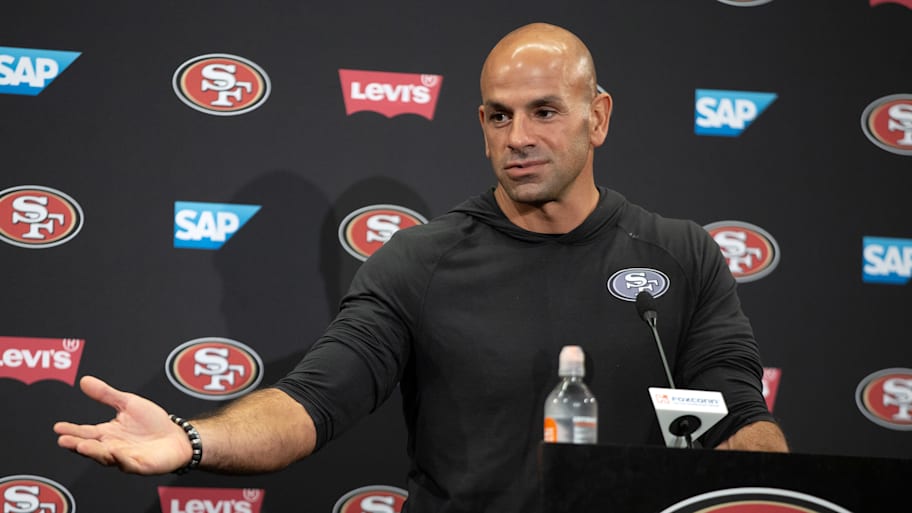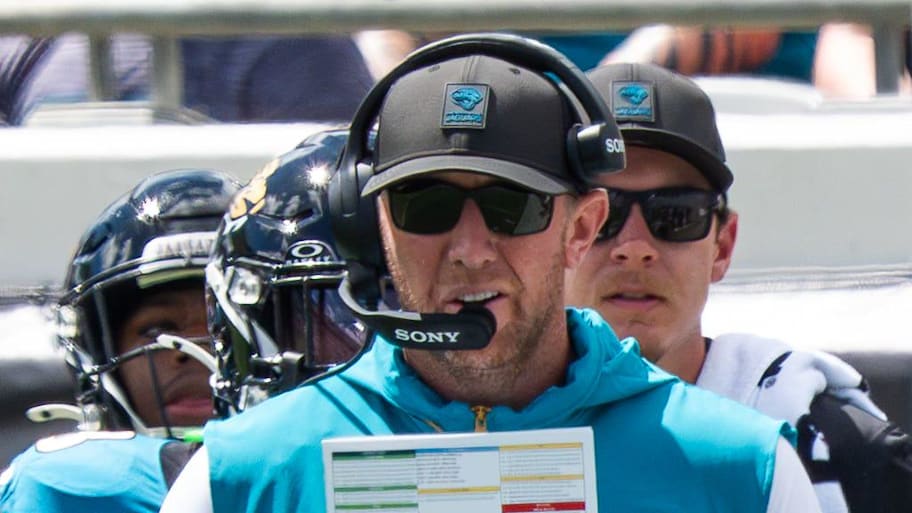
On Thursday, just three days before the 49ers’ Week 4 matchup with the Jaguars, San Francisco defensive coordinator Robert Saleh had his media availability and set the record for most fascinating transition in the history of coaching press conferences.
“You know, um, Jacksonville, this is a very young, but it’s a very talented group,” he said. “Liam [Coen] and his staff, a couple of guys coming from Minnesota, they’ve got a—legally—a really advanced signal stealing type system where they always find a way to put themselves in an advantageous situation. They do a great job with it. They formation you to try to find any nugget they can. So we’ve got to be great with our signals and we’ve got to be great with our communication to combat some of the tells that we might give on the field.
“They’re almost elite in that regard. That whole entire tree. From Sean [McVay], to Kevin O’Connell, to all those guys, they all do it. So, there’s challenges. They’re gonna catch us in some situations where they have the advantage and we just gotta play good, sound, fundamental football and do our best to execute.”
Right right, this is a young team, talented team, they also have an operation that is not unlike the one the U.S. military possessed during World War II to sink U-boats.
Robert Saleh says the Jaguars offense has a signal stealing system that’s legal:
— Coach Yac 🗣 (@Coach_Yac) September 25, 2025
“Liam Coen and his staff coming from Minnesota they got legally a really advanced signal stealing system where they always find a way to put themselves in an advantageous situation. They do a great… pic.twitter.com/XVJfPKhL2y
Remarkably, the statement didn’t elicit a follow-up until two questions later, when a reporter asked: Who are they stealing the signals from?
“That’s the ultimate trick. Whether it’s people from the sideline or whether it’s our individual hand signals—whatever nugget they can find, they catch it. And they always happen to find themselves in good situations based on the coverages shown. And there’s nothing illegal about it. I’m not suggesting that. It’s just, you can tell they have a [inaudible] system that is getting them into a very advantageous position multiple times during the course of a game.
And then: Have you ever experienced? Like, has this ever happened to you during a game, like, Wow, they’re stealing my signals?
“Were there [times] we were like, Damn, how did they know to get to that play? Yeah. We dealt with it [against] Minnesota last year [when Saleh was the head coach of the Jets]. They got us into a couple of situations. You can see it on tape when we’re studying. It’s like, damn, how’d they know to be in that call at that time? We’ve experienced it with the Rams a little bit. It’s not an uncommon thing, it’s just this group of people, they’re pretty damn good at it.”
After spending time Thursday talking to a handful of non-49ers coaches, here is the requisite perspective on this situation. Yes, legal sign stealing is incredibly prevalent and almost necessary for success in the NFL. And, yes, there is a theory behind Saleh’s brilliance in bringing it up.

First things first, it would seem Saleh was referring specifically to Jaguars offensive coordinator Grant Udinski when he mentioned “a couple of guys coming from Minnesota” as proprietors of this system. Udinski and offensive line coach Shaun Sarrett are the only former Vikings coaches on the offensive staff that Coen built in his first year in Jacksonville. There are no defensive coaches who came from Minnesota to Jacksonville.
Udinski is highly regarded in coaching circles and was heralded as an integral part of the O’Connell staff that elevated Sam Darnold to a fringe MVP candidate in 2024. He worked with Minnesota for three seasons, with one previous NFL stop in Carolina.
Second things second, it’s important to remember what is legal and not legal when it comes to sign stealing in the NFL. Teams are permitted to use television tape and all-22 film (film that is shot by each team during a game from designated areas at midfield and behind both end zones) to break codes. Coaches are also allowed to notice signals being relayed from the press box during a live game.
It’s not legal, as Bill Belichick and the Patriots once discovered, to film coaching signals from unauthorized areas, such as from the sideline or, in one of the great forgotten scandals of the post-Spygate era, in the Bengals’ press box while claiming to do a video feature on your advance scouts.
This is why Saleh, it would seem, mentioned multiple times the above-board nature of what is happening.
Now, as to what these coaches can glean, several current and recent NFL coaches mentioned that sign-stealing processes encompass noticing how an opposing defense reacts to or identifies your formations. Next, you’re going to focus on any tape that includes a defender’s hand signal and relate it to the corresponding coverage.
“DB hand signals tell you what [most defenses] are doing,” said one coach with knowledge of the McVay–Kyle Shanahan–O’Connell coaching fraternity.
Coaches also pore over television tape and database any words that are picked up on the field microphones. When combined, this can begin to tell the story of a unit’s habits over the course of a season. This leads to another not-so-well-kept secret in the NFL: Defensive coaches who use signals tend not to change them all that often. While this is due to a lot of factors—injury rates and limited practice time chief among them, keeping the need for simplicity at a premium—it’s understandable to put oneself into the shoes of a defensive coordinator already underwater trying to combat an offensive-weighted rulebook, officiating crew and talent pool, and hard pressed to find time to reshape the entire wordless communication system on a week-to-week basis.
Conversely, defensive coordinators will use television tape of quarterback cadence and mimic it during the week to get a jump on the ball, in addition to matching hand signals and code words to plays from television tape and the all-22 film.
Because of all this, Jacksonville, coaches say, can then alert what coaches call a “beater” based on how these different indicators have lined up historically. Hence, Saleh referencing moments, as the head coach of the Jets, when facing Udinski and O’Connell, in which the Vikings immediately checked to a play that would gash those coverages. The Vikings were second in the NFL in plays of 20-plus yards in 2024, and had four such plays against the Jets. Minnesota was also tied for third in 40-plus-yard plays.
Some NFL quarterbacks are presnap players, like Aaron Rodgers or Jalen Hurts. They prefer to get the cleanest possible picture of what a defense is going to look like before the start and that helps inform them as to what might happen soon after. In those cases, the mental side of warfare is more useful. Other quarterbacks are postsnap players, and are more comfortable in the moment, reacting to what is taking place in the flow of the play and aligning it to a set of rules.
Some quarterbacks, especially coming from the absolute lawlessness of college football where sign stealing is, to say the least, taken pretty seriously, may increasingly require these little presnap hints in order to stay above water and survive.
Interestingly enough, Jaguars quarterback Trevor Lawrence came from Clemson where, at least on the defensive side of the ball, his coaches ran what was believed to be one of the most sophisticated sign-stealing operations in college football. Here’s SI’s Pat Forde on former Tigers defensive coordinator Brent Venables from 2020. Here’s the money quote:
“One time we got in a formation that is 90% run, and they dropped eight [defenders in coverage]. They knew it was a pass call. It was like, ‘Are they listening to our headsets?’”
One of the most pressing questions to ask in the aftermath of Saleh’s press conference is: Why? Coaches are normally averse from making any sort of incidental splash during an outing with the media … unless that particular splash was a preplanned effort to send some sort of message. Saleh, as a former head coach, knows this as well as any coordinator.
One coach whom I spoke to for this piece said of sign stealing: “We all have fake signals and calls to f--- with one another.”
But what if even mentioning the knowledge of the sign-stealing operation in a public setting was also part of the subterfuge? What if Saleh’s press conference was not an instance of a police officer accidentally tipping off the criminal but leading him to the address of an awaiting SWAT team?
As another coach noted, outside of changing signals, the other way to defeat sign stealing is to create even the thinnest shred of doubt within an opponent in the sign-stealing operation itself. If a quarterback doesn’t get a positive response from the gathered information, inevitably, he’s going to be too scared to trust it.
In short, the prevailing theory is that Saleh may have mentioned it to get in the heads of Jaguars’ coaches, who now don’t know whether Saleh will change all his signals or just enough of his signals. Or none of his signals. Remember the part when he said, “So we’ve got to be great with our signals and we’ve got to be great with our communication to combat some of the tells that we might give on the field.”
It’s worth noting that, in asking around, coaches did mention that Saleh’s defenses tend to have less complex signals. My read? Easier to change.
Or not!
More NFL on Sports Illustrated
This article was originally published on www.si.com as Why Robert Saleh May Have Accused the Jaguars of (Legal!) Sign Stealing.







